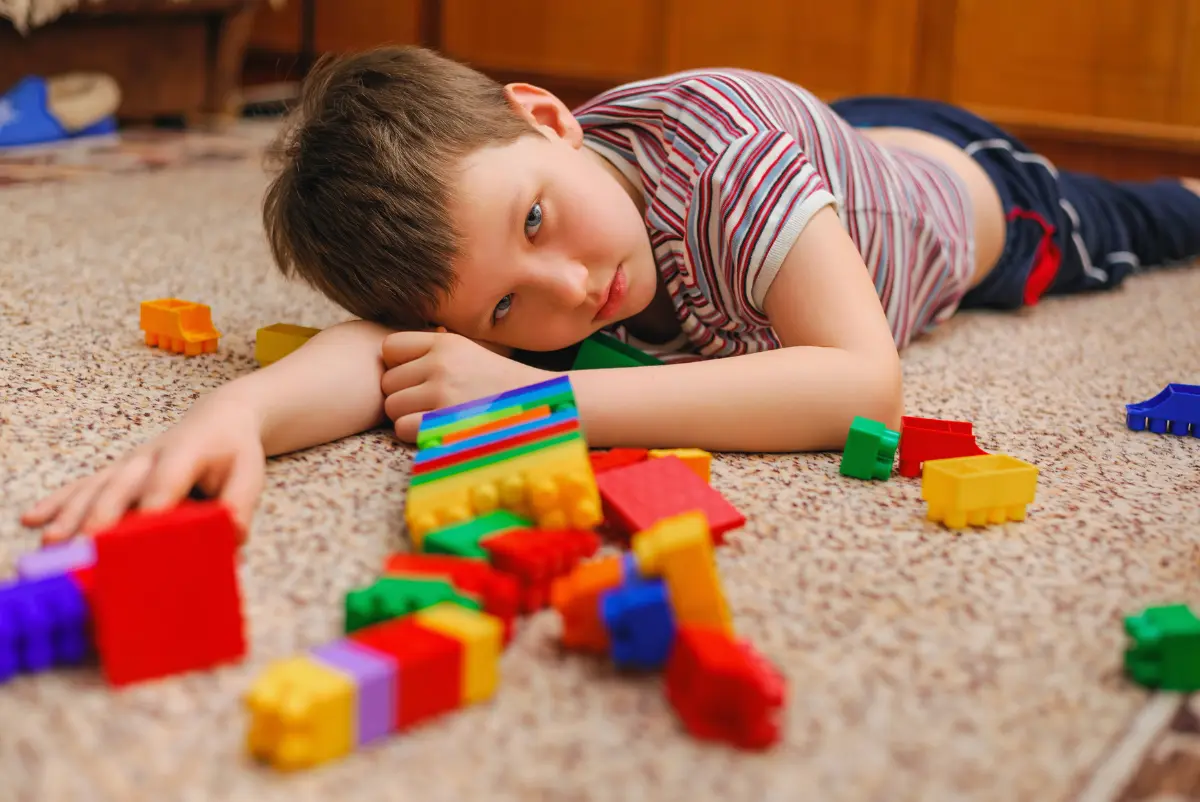As a parent and an expert in child development, I know that parenting can sometimes be tough. One common parenting practice that may leave kids scratching their heads is when parents take away things they love. Have you ever wondered why parents do this? Well, you’re not the only one! Many kids and parents alike have pondered this question. In this blog, we’ll explore the reasons behind this parenting behavior and shed light on why parents may take away things we love.
Parents may take away things their children love as a form of discipline or to teach them responsibility and consequences for their actions. As parents, we all want what’s best for our children. We strive to raise responsible, respectful, and self-disciplined individuals. And sometimes, taking away things our kids love may seem like the best course of action. But why do parents resort to this strategy? Is there a method to the madness? Let’s delve into the world of parenting styles and understand the reasoning behind this common practice.
Parenting Styles
Parenting styles greatly influence how parents discipline and guide their children, including the decision to take away things kids love. There are various approaches, including authoritarian, permissive, and authoritative parenting styles. Authoritarian parents may take away privileges as a strict form of discipline, while permissive parents may avoid this approach altogether. The authoritative parenting style, which strikes a balance between strictness and leniency, may use taking away things kids love as a tool to teach responsibility, self-control, and respect for boundaries in a reasonable and balanced manner.

We, as parents, must remember that each child is unique and may respond differently to various parenting styles. It’s essential to find a parenting style that aligns with your child’s personality, needs, and developmental stage, and be flexible in adjusting your approach as they grow and mature. Understanding the different parenting styles can help shed light on why parents may take away things kids love and the intentions behind this practice. Now, let’s explore the reasons in more detail.
Reasons Parents Take Away Things Kids Love
As parents, we sometimes resort to taking away things our kids love as a form of discipline or guidance. While it may seem like a tough approach, there are valid reasons behind this parenting practice. Let’s dive into some common reasons parents may take away things kids love and explore them in more detail.

1. Teaching Responsibility and Consequences
One of the main reasons parents take away things kids love is to teach them about responsibility and consequences. When kids fail to fulfill their responsibilities or make poor choices, taking away privileges can be used as a consequence to help them understand the impact of their actions. For example, if a child neglects their homework or chores, a parent may take away their screen time or other privileges as a way to emphasize the importance of fulfilling responsibilities.
2. Encouraging Self-Control
Another reason parents may take away things kids love is to encourage self-control. Parents can help their children learn to manage their impulses and develop self-control by setting boundaries and consequences. For instance, if my child becomes addicted to video games and neglects other responsibilities or activities, I may take away the privileges for a period to promote healthier habits and self-regulation.
3. Establishing and Enforcing Boundaries
Taking away things kids love can also be a way for parents to establish and enforce boundaries. Boundaries are important for children to learn about limits and respect for rules. Parents may remove privileges when a child crosses a boundary, such as staying up past bedtime, talking back, or engaging in risky behavior. This helps children understand that there are consequences for crossing boundaries and promotes a sense of accountability and respect for rules.
4. Teaching Delayed Gratification
Delayed gratification is an important life skill that kids need to learn. Taking away things kids love can help parents teach their children about delayed gratification, which involves waiting patiently for rewards or privileges. For example, if a child misbehaves at school, a parent may take away a planned outing with friends as a consequence. This teaches the child that actions have consequences and that they need to earn their privileges through responsible behavior and patience.
5. Correcting Behavior and Promoting Positive Values
Parents may also take away things kids love as a way to correct behavior and promote positive values. For instance, if a child engages in bullying behavior, a parent may take away privileges as a consequence to address the negative behavior and emphasize the importance of kindness and respect. This helps children understand the impact of their actions and encourages them to develop positive values and behaviors.
6. Encouraging Learning and Growth
Taking away things kids love can also be a strategy to encourage learning and growth. Parents may eliminate distractions like video games or social media to encourage their children to focus on their studies, hobbies, or other productive activities.
7. Safety Concerns
Sometimes, parents may take away things kids love out of safety concerns. For example, parents may restrict screen time to protect their children’s eyesight or take away a dangerous toy to prevent accidents or injuries.
8. Fostering Communication and Problem-Solving Skills
Lastly, taking away things kids love can also be a way for parents to foster communication and problem-solving skills. Using privileges as a consequence can make parents open up a dialogue with their children to understand the underlying issues or problems that may have led to the need for discipline. This encourages children to express their thoughts and feelings, promotes healthy communication skills, and teaches them problem-solving skills to avoid future issues.
Alternatives to Taking Away Things Kids Love
In the same vein, taking away things kids love as a form of discipline may not always be the most effective or preferred approach for every child or situation. Fortunately, there are alternative strategies that parents can consider to discipline and guide their children without resorting to taking away things kids love. Let’s explore some of these alternatives in more detail.

1. Positive Reinforcement
Instead of taking away privileges, parents can use positive reinforcement to encourage desired behaviors in their children. This can involve praising and rewarding good behavior, such as completing chores, homework, or other responsibilities. Positive reinforcement can also involve providing incentives, such as earning extra playtime, a special treat, or a small gift as a reward for positive behaviors. This approach focuses on promoting positive behaviors and creating a positive association with responsible actions rather than using punishment or taking away things kids love.
2. Time-In and Communication
Time-in is an alternative approach to discipline that involves creating a safe space for open communication and reflection with your child. Instead of taking away privileges, parents can sit down with their children in a calm and non-confrontational manner to discuss the issue at hand. This approach allows for open communication, active listening, and problem-solving together. It encourages the child to express their thoughts and feelings, promotes healthy communication skills, and helps them understand the impact of their actions. Time-in can also involve teaching coping skills and strategies for managing emotions in a positive and constructive way.
3. Natural Consequences
Another alternative to taking away things kids love is allowing natural consequences to occur. Natural consequences are the direct result of a child’s actions and do not involve imposed consequences from parents. If a child forgets their homework at home, the natural consequence would be receiving a lower grade or facing the consequences at school. This approach allows children to learn from their mistakes and understand the cause-and-effect relationship between their actions and the outcomes.
4. Setting Clear Expectations and Consequences
Setting clear expectations and consequences can also be an effective alternative to taking away things kids love. By establishing clear rules, boundaries, and expectations with your child, you provide them with a clear understanding of what is expected of them. Additionally, by establishing clear consequences for not meeting these expectations, such as losing a privilege or having a logical consequence related to the behavior, children are more likely to understand the consequences of their actions and make responsible choices.
5. Collaborative Problem-Solving
Collaborative problem-solving involves working with your child to find solutions to problems or challenges together. This approach promotes active listening, empathy, and understanding of each other’s perspectives. Involving your child in problem-solving can empower them to take ownership of their actions and participate in finding solutions. This approach promotes critical thinking skills, encourages responsibility, and fosters a sense of autonomy and ownership in children.
6. Teaching Emotional Regulation
Teaching emotional regulation skills can be another effective alternative to removing things kids love. Helping children understand and manage their emotions in a healthy and constructive manner can teach them to cope with challenges and make responsible choices. This can involve teaching breathing techniques, mindfulness exercises, or other strategies to manage emotions and avoid impulsive behaviors.
FAQs
Why do parents take away our favorite toys or gadgets?
Parents may take away things their children love, such as toys or gadgets, as a form of discipline or to teach responsibility. It could be related to the misbehavior, excessive use, or neglecting other important tasks like homework or chores.
Is it fair for parents to take away things we love?
Fairness is subjective and depends on the situation. Parents may take away things their children love to enforce boundaries, teach discipline, or correct behavior. However, parents should endeavor to communicate and explain the reasons behind their actions.
How do parents decide what to take away from us?
Parents may take away things from their children based on the severity of the behavior, the impact on their child’s well-being or responsibilities, and the values and rules they have set as a family. It varies from situation to situation and from family to family.
How can I cope with my parents taking away things I love?
Coping with parents taking away things you love can be challenging. Try to understand their perspective, communicate openly, and follow the rules and guidelines they have set. You can also express your feelings and concerns calmly and respectfully.
Are there any positive reasons why parents take away things we love?
Yes, there can be positive reasons why parents take away things their children love. It could be to teach responsibility, encourage healthy habits, promote balanced use of time, or foster better communication and understanding within the family.
What can I do to avoid my parents taking away things I love?
To avoid having things you love taken away by your parents, try following their rules and guidelines, communicate openly, and be responsible with your actions. Show respect towards their decisions and strive to meet their expectations.
How can parents find alternative ways to discipline without taking away things we love?
Parents can find alternative ways to discipline without taking away things their children love by using positive reinforcement, setting clear expectations, offering choices, and discussing consequences. They can also encourage open communication, listen to their children’s concerns, and involve them in problem-solving.
What should I do if my parents are unfairly taking away things I love?
If you feel like your parents are unfairly taking away things you love, expressing your concerns calmly and respectfully is important. Try to understand their perspective and ask for an explanation. If needed, involve a trusted adult, such as another family member, teacher, or counselor, to mediate the situation.
How can parents balance taking away things we love with showing love and support?
Parents can balance taking away things their children love with showing love and support by explaining the reasons behind their actions, offering alternative solutions, reinforcing positive behaviors, and maintaining open communication. Parents need to demonstrate understanding, empathy, and unconditional love even when discipline is necessary.
Is it normal for parents to take away things we love?
Yes, it is normal for parents to take away things their children love as a form of discipline, teaching responsibility, and enforcing rules. However, such actions’ frequency, severity, and fairness may vary depending on individual families and circumstances.
Final Thought
As parents, we must understand that taking away things kids love may not always be the most effective or preferred approach for discipline. There are alternative strategies that can promote positive behaviors, open communication, and healthy problem-solving skills in children. By exploring the alternatives, parents can guide their children in a constructive and positive manner. It’s crucial to consider each child’s unique needs and developmental stage when choosing a discipline approach and to prioritize building a healthy parent-child relationship based on mutual respect, empathy, and understanding.

Dedicated father, an accomplished psychologist, and an experienced educationist. With a passion for guiding parents on the rewarding journey of raising children, I am the perfect companion for all your parenting needs. My insightful and practical advice, coupled with my wealth of experience, makes me the go-to expert for all matters related to parenting. Follow this blog for a glimpse into the world of effective parenting and learn how to navigate the ups and downs of this beautiful journey with confidence and grace.




